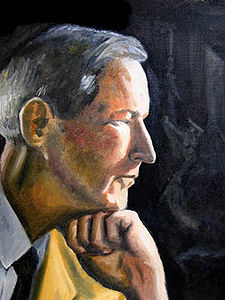Serendip is an independent site partnering with faculty at multiple colleges and universities around the world. Happy exploring!
Notes Towards Day 23: Turned by/Schooled by/Strolling with William James

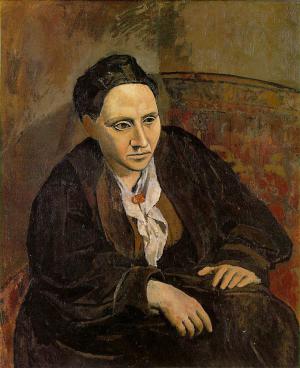 Gertrude Stein (1874- 1946) by Picasso |
Jacques Barzun (1907 -??!!) |
class notes by Penguins
I. looking forward
we've run out of notetakers:
any volunteers for next 3 classes?
(anyone short on postings...?)
For Wednesday, read posted excerpts from
Louis Menand's The Metaphysical Club:
A Story of Ideas in America, available via password @
/~adalke/jamesfam/Menand.pdf
On Friday @ 5 p.m: 4 pp. on-line paper
due on William James and you-or-someone-else
(let me know if you want to talk)
Next week: some BMC speeches by Henry and William,
both, on Monday (paired w/ two more contemporary ones);
and your "final exam" performance on Wednesday
aseidman, jrlewis, kjmason, Marina, exsoladsolem tell
the others what this is about/forms it might take?
will need to know group arrangements by next Monday
II. looking back?
reviewing 'cash value' of PG's visit?
Richard Rorty's role in the conversation?
The light as aseidman has seen it: Oh dear, what a dilemna.
I delighted in Professor Grobstein's lecture today. His clarification of what the poorly chosen Jamesian terms actually meant was excellent, and now I feel that I better understand what James meant to say. I am no longer slogging through the mire of his ineffectual enunciation of such things as truth, belief, etcetera.
Unfortunately...I think I like him even less, being unable to give him any further of the benefit of the doubt. We have now established that James really did not believe in such things as objective truths...which is, pardon me, a bunch of nonsense. There's no need for me to re-iterate my opinions about subjective versus objective truths, so let's move on.
More encouraging was our discussion of what "belief" really meant to James. If, as Professor Grobstein said, belief is something that we accept to govern our actions, and yet know to not be truly justifiable, then I think we are giving people a little more conscious positive agency. We choose to believe, even though we know that perhaps there's no reason for it. We don't choose to believe becuase our beliefs naturally come true. Perhaps I'm nearing a better understanding of this Jamesian stuff.
effect of "individual subjectivities"?
cf. Bi-Co News article:
"Keep Personal Anecdotes out of the Classroom:
This unwelcome classmate, this party crasher or intelligent discussion, is the semi-irrelevant personal anecdote .... if others have not shared in your experience, they will likely gain nothing from your story .... they do not generate intellectually challenging conversation."
III. (in cf. w/ the different dimensions
highlighted by each of our in-class guests),
3 more visitors today who have all
"gone to school to William James":
W.E.B. DuBois, Gertrude Stein, Jacques Barzun
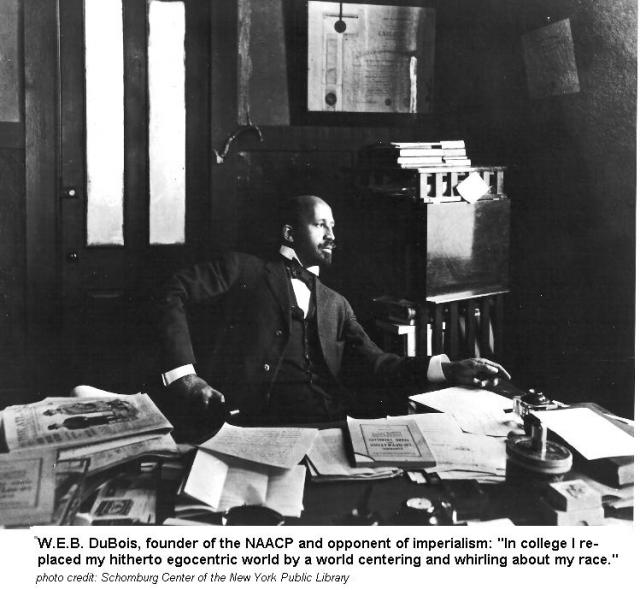
His "education" confronted by "the truth in the world," W.E.B. Dubois moved from studying philosophy to history and social problems: "The turning was due to William James," his favorite Harvard professor (Dusk of Dawn, 1940).
Gertrude Stein was "turned" in a different direction
(or was she....?)
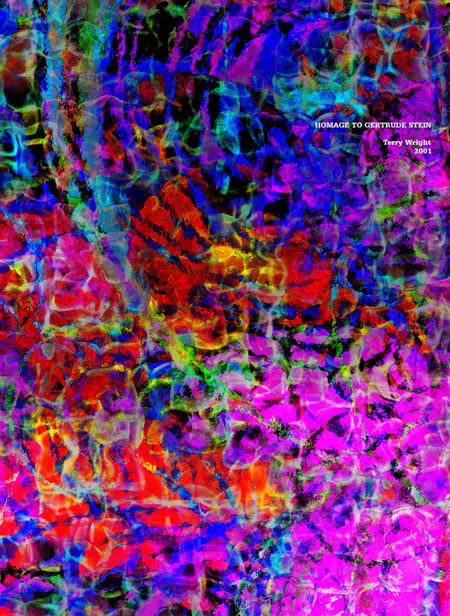
Homage to Gertrude Stein
IV. She has joined us here before
(in the first WJ class, about cultivating habit):
"Her literary experimentation centered on the creation of a continuous present, a refusal of the forward movement of time....a dangerous kind of self-absorption..."
Fabelhaft: She creates these fragile gossamer images with her mixed-up syntax and use of words. It's interesting to feel myself slowing down and really reading the text...I'm intrigued by the idea that Stein creates, or forces the reader to use, new neural pathways. The way Stein twisted William James's theories is amazing. The fact that she used put his ideas into an art form is pretty cool.
jrlewis's reading Tender Buttons into a recipe
Choose a line (or a paragraph) from "Objects" to read aloud--
then gloss: what do you notice about this passage?
"Steinian texts produce in all readers bewilderment...."
Jeanette Winterson, Art Objects: Essays on Ecstasy and Effrontery, 1996: the question "Do I like this?" will have to be the opening question and not the final judgement. An examination of our own feelings will have to give way to an examination of the piece of work....It is right to trust our feelings but right to test them too....When you say "This work has nothing to do with me," when you say, "This work is boring/pointless/silly/obscure/elitist etc."...the work [might fall] so outside of the safety of your own experience that in order to keep your own world intact you must deny the other world of the painting....True art, when it happens to us, challenges the "I" that we are....
for most of us the question "do I like this?" will always be the formative question. Vital then, that we widen the "I" that we are as much as we can .... A poem, a piece of fiction of any value is not instantly accessible. The reader, like the writer, has to work, and as long as work remains a four letter word, the average reader will not understand why they should struggle through their leisure time .... What we cannot do is judge a book by how little bother it gives us....
Susan Holbrook, "Lifting Bellies, Filling Petunias, and Making Meanings through the Trans-Poetic." American Literature 71, 4 (December 1999): 751-771.
decoding seems to miss the mark: the one-to-one equivalence that encryption presumes would deny the polysemnic, indeterminate trajectories of Stein's vocabulary
"insistence" draws our attention to the material of language, which is generally rendered a silent ferry to the signified .... iteration invites us to engage sound and shape in a more intimate way--to enjoy close reading.
--[from "A Transatlantic Interview 1946:] "You had to recognize words had lost their value in the Nineteenth Century ... they had lost much of their variety, and I felt that I could not go on, that I had to recapture the value of the individual word, find out what it meant and act within it."
Stein ... repeatedly overturns moments of clear referentiality ... in the genre that "is doing nothing but using losing refusing and pleasing and betraying and caressing nouns .... that is poetry really loving the name of anything and that is not prose."
Dana Cairns Watson, "Modifying the Mind: William James and Tender Buttons." Gertrude Stein and the Essence of What Happens. Nashville: Vanderbilt University Press, 2005.
Stein could change her readers' habits of mental association by changing the arrangements of words on the page ... the ways she arranges words ... are an artistic adaptation of James's scientific work .... Stein calls attention to our necessary habits of human thought ... and makes us question assumptions that so many of us hold so deeply we haven't noticed them .... Stein's weird series of words might have the capacity to rearrange those arrangements in our minds ... redesign our neural pathways, developing in us a greater number of associational paths.
"the art the of reading ... is the art of skipping" ... We quickly pass over signs, ignoring them in order to get to what is signified. We do not fully revisit information that we assume to be familiar. What makes us conscious is hesitations, deliberation, and choice ....habits of sight and thought are almost impossible to change .... But James may have inspired Stein to try.
"Buttons ... James uses to describe thoughtless, habitual actions, and 'tenderness' ... he uses to describe the effect of new and different stimuli on the mind. In Tender Buttons, we are certainly looking at the mundane from an unusual perspective ... that forces our thoughts down different paths .... Stein ... actively prevents readers from ... firm conclusions.
Stein heightens our consciousness by producing strings of words that cause our instincts to contradict each other. When that happens, according to James, we lose those instincts and "lead a life of hesitation and choice, an intellectual life" .... Instead of telling us what she's talking about, Stein obliges us to figure it out. Without a right or wrong in view, the exercise forces readers into a more complete experience of single words .... readers pleasingly educated by Stein's Tender Buttons might become less easily manipulated by words ... to slow down and look around.
Stein's reform of English is also a reform of science, since both depend on our mental tendencies to simplify, generalize, categorize--to delimit fields of inquiry and look for the core of any issue ... thought is prone to becoming less thoughtful and more automatic.
James laments that the "ideal of every science" is "a closed and completed system of truth," because this leads scientists to ignore "phenomena unclassifiable within the system" .... Stein carries this one step further: if we accept ready-made words and phrases, we may never develop the words to hold new ideas that might compose a more successful system .... new forms might allow new thoughts, or at least new relationships between old ones.
Stein seems to warn that people use language not originally but terminally, making it work in bureaucratic service. We therefore don't think originally but tend to believe what we are told .... In the interest of undermining our habits, Stein produces a literature that ... will not make the usual sense .... But then we notice that any word has a fringe ... of associations, and that we can choose among them instead of depending on habit to get us to meaning. According to James, we become more conscious....
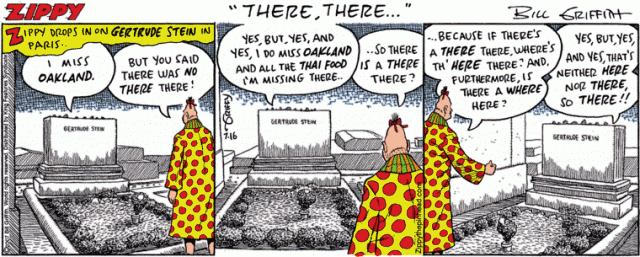
[for Calamity, who's doing a cartoon of William James...]
![]()
"William James ... still serves me after half a century of meditation...."
Do the same w/ Barzun as we did with Stein:
find a passage, read it aloud, and gloss...
269: the earthquake
274: complaint re slow minds
276: deep sadness behind playfulness:
"'better' is not fated but possible"
277: teaching as an invasion of privacy, a meddling with a stranger's self-development
278: "meeting the mental needs and difficulties of other persons, needs that I couldn't possible imagine and difficulties I couldn't possibly understand ... not to have to accommodate myself to this mass of alien and recalcitrant humanity, not to think under resistance, not to have to square myself with others at every step I make...!"
280: The "little sensitive, impulsive, associative, and reactive organism, partly fated and partly free" calls for [what kind of] teaching?
281: James conceived of all education as the making of useful habits .... "Respect always the original reactions .... Bad behavior, from the point of view of the teacher's art, is often a better starting point that good behavior ...." James analytic mode: we start with what is natural; it is the material to work upon; but it does not set the goal, for more than one is possible and desirable.
282: the child's mind ... is not an engine chugging away in regular five-stroke motion; it is an artist mind; it works by jumps of association and memory, by yielding to esthetic lures and indulging privates tastes -- all in irregular beats of attention, in apparent wanderings ... There is no formula ....
284: "the American textbook Moloch, in whose belly living children's minds are turned to ashes, and in which the science is pre-digested for the teacher and for the pupil comminuted into small print and large print and paragraph headings and cross references and examination questions, and every up to date device for frustrating the natural movement of the mind when reading and preventing that irresponsible rumination of the material in one's own way which is the soul of culture" .... Textbooks grew out of the specialist attitude, akin to that of the feudal lord behind his moat....
Of what use is a college training? ... "it should help you to know a good man when you see him" [in cf. w/ the "credentials society"]
286: James questioned the ways of higher education. He thought that college gave "glibness and flexibility" .... He saw, too, that for most men and women the intellectual life as such has no appeal.
291-2: his syntax is much more complex than ours ... and you might argue that his lucidity ... has become discontinuous ... the forward movement ... comes form the author's offering his thought ... as being made
293: It is not the sense of the words that is refused entrance to the mind, but the implied summons to reorganize all one's familiar ideas.
296: Whitehead: "In carrying on the philosophy of William James [John Dewey] enormously narrowed it. With James the consciousness of the everpresent complexity and possibility in human experience is always implicit ... Dewey is without it.
299: Jamesian empiricist pluralism ultimately led to the principle that Godel's theorem established about the impossibility of devising completely consistent systems ... Niels Bohr was strongly influenced by William James.
301: every philosopher's vision has a center ...the clearest word we could choose would be THICKNESS ... a favorite with both William and Henry. It stands for the intense awareness of multiplicity .... the opposite of the flight into concepts .... For novelty arises, observations vary with perspective, the world ... to keep its thickness and reality must forever be reconceptualized and reenvisioned.
302: his death seemed to him but a trifling incident ... should one surmise that he grew weary of his own supercharged self ... and looked to death for shelter from those insistent individual traits ..."What has concluded that we should conclude in regard to it?"

